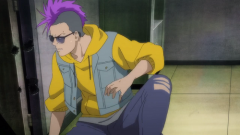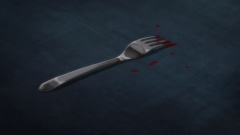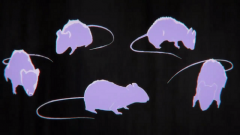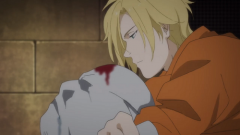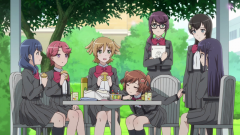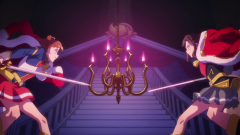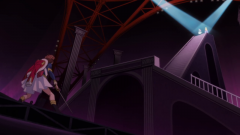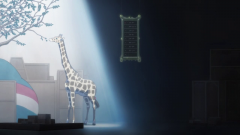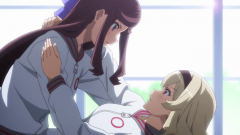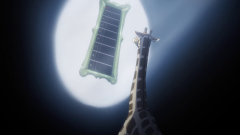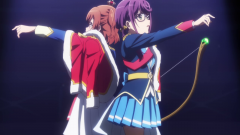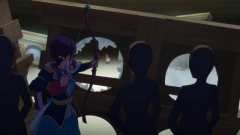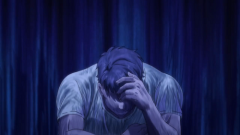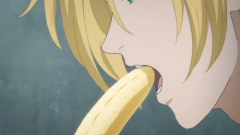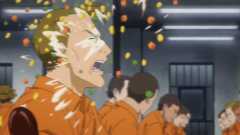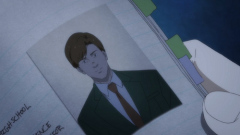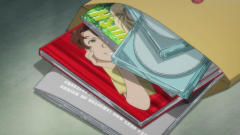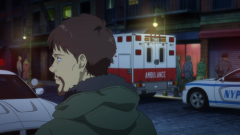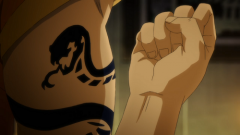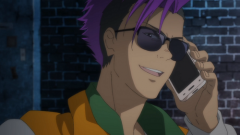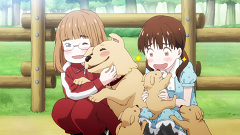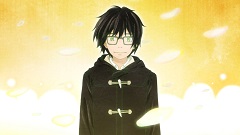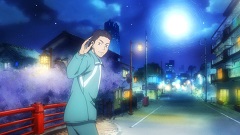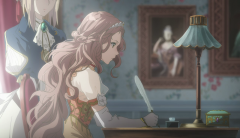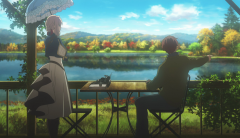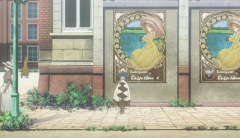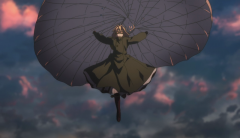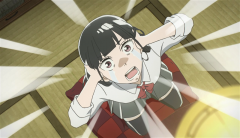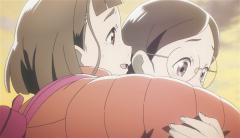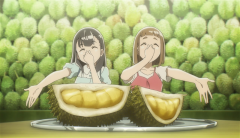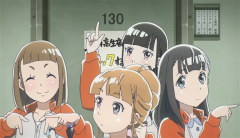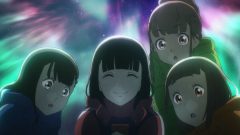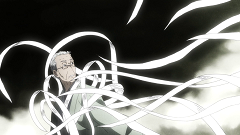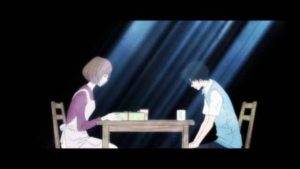Violet Evergarden’s existence has surely been a public one. Acclaimed before everyone lick a taste of it (it was awarded for grand prize in the fifth Kyoto Animation Award’s novel category in 2014 – read, KyoAni awards), it goes without saying that Violet Evergarden is one of the most anticipated show of the sparse Winter 2018 season. As with my first impression, I left the show feeling a bit torn about it. On one hand, the production is top notch and when the show hits right, it sweeps you right away. On the other hand, I don’t buy much of Violet’s central conflicts and the show has a tendency to go over-soapiness and try to explain too much, which I never fond of. To be fair, Violet Evergarden has never known for its subtlety, its intend is always to pull as many punch as possible. Violet Evergarden, therefore, is at its strongest when it uses Violet as an observer, to put her as a background for characters with their own struggles have to finds ways to overcome. When she stays in the spotlight, however, the amount of predictable development and cheesy moments always overwhelm the show’s own emotions.
Let’s begin our journey with the way KyoAni adapts these Light Novels into anime form. The Light Novels start with Violet as an already established Memory Doll, and makes it ambiguous as to whether Violet is a robot or a human. Throughout many encounters with clients should we learn more about the violent pass of Violet, and her super-soldier self. To put it another way the Light Novels uses her more as a reporter with set personality. In the anime version however, KyoAni decides to shift the focus to the whole character arc of Violet. Make her vulnerable at first, and then build her character gradually. I appreciate the intention (in fact about half of their episodes are original material. Impressive), since anime medium works different than written form so it’s always a wise move to modify the content, so it’d fit with the visual medium; BUT I’m not sure if these changes improve the narrative. The thing is, Violet as a central narrative is a boring lead and she’s utterly unrelatable. She doesn’t possess any personality traits and repetitive responses get pale really, really fast.
But to build Violet the character from ground zero also means that when she changes, the changes will be massive. Violet is suppose to be a robot, at least in terms of narrative sense. Everyone regards her as a killing machine, she sees herself as someone’s royal dog, the show visualizes her as a bleeding doll, and the novel purposely frames her as a robot, anything but a human. It’s also the show’s narrative that Violet needs to learn these emotions in order to truly become a full-fledged human. There are some neat ideas behind it, namely the way she realizes the bad deeds she has done in the past. When she doesn’t realize, it’s okay to live on, but when she does, the fact that she ends many people’s lives comes back to hurt her. Relying on someone else to live (in this case, Gilbert), is as sad and unbalanced as it might get, and her own arc has to do with her coming to terms with the fact that Gilbert is no longer there for her and raise independent on her own. It comes to episode 8 and 9 which feature one huge flashback to the day Gilbert died and Violet experiencing her grieving process. While I personally feel this flashback a huge waste of time given we don’t learn anything new, it feels like a complete arc for Violet. That is the reason why the real climax in the end doesn’t do much to me since we already see her arc done in previous episodes.
Violet Evergarden’s best parts are the standalone episodes where Violet doing her jobs – reciting or writing letters for their clients. At heart, these letters represent the desire to connect between people, they represent all those raw feelings that can’t be said out loud, and Violet is in middle of its own trying to translate those feelings into written words, and learn about emotions in the process. All these little stories, from a playwright making a new children-play, to the sick mother write future letters for her daughter, to write love letters from the heirs of two nations, each of them adds more layer to the concept of ghostwriting and her job of connecting the hearts of people together and most of them give a satisfying emotion to their story. The best episodes amongst them are episode 10 (sick mother and her daughter) and episode 7 (playwright).
The production by and large is impressive with detailed character designs (it’s one rare production where all the background characters are fully portraited with their own costumes and figures), consistent animation and striking background designs. Each story where Violet performs her jobs has different kind of settings, and Violet Evergarden really gives it their own on breathing life to those places. The lighting, however, doesn’t give the show a justice here. All interior scenes feel too dark, for one thing, and the way Violet Evergarden uses their focus lenses which make the centre of focus detailed and the rest blurred) hurts the show more than support it. It’s one of the case where I consider they over-playing with post-production. Such a shame since it feels like they don’t have enough confidence to their raw production.
As for characters, it pains me to say that the supporting cast doesn’t reach their full potential either. There are many anime original characters, and most of them have their own episodes to shine. But Hodgins and Cattleya are surprisingly underdeveloped despite appear almost in all episodes. Gilbert is just a vessel for Violet’s personal growth and the appearance of Dietfried in the end doesn’t leave much impact either. There is a hint of the aftermath of postwar era, which I somewhat enjoy but I don’t feel that it reaches its full potential. And all the drama is over-blown, which kind of bang me hard in the head.
All in all, Violet Evergarden is a roller coaster of emotions, in more ways than one. It either sweeps you away with its grandeur approach, or it doesn’t (like myself). The central development is a conventional and predictable one, and the show’s best moments are the ones where they move away from Violet as the central conflict. Despite my grumpy it’s still a solid made and worth watching at least one, if only for the beautiful CG-animated mechanical hands of Violet.

